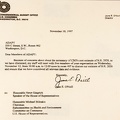News
"CASA will pass only if we are able to organize a coalition like the one that got the ADA passed."
--Mark Johnson
[Headline] Mi CASA
A nursing home is no home at all, and everybody knows it.
The answer is not a better nursing home, but a better option—like cheaper, more humane community-based attendant services. That option—denied to most people with disabilities with limited financial re-sources—could become avail-able in every state if a new amendment to Title XIX of the Social Security Act becomes law.
HR 2020, known as CASA (the Community Attendant Service Act), allows Medicaid recipients eligible for nursing home care to use the money for "qualified community-based attendant services" instead. In its cur-rent form, introduced in June by House Speaker Newt Gingrich, CASA also:
• Requires services be provided in the most integrated setting possible.
• Provides attendant services
a) based on an assessment of functional need;
b) in a home or community-based setting to include a school, workplace, recreation or religious facility;
c) with various delivery options including vouchers, direct cash payments, fiscal agents and agency providers;
d) selected, managed and controlled by the consumer;
e) with backup and emergency attendant services;
f) including voluntary train-ing on how to select, manage and dismiss attendants;
g) according to a service plan agreed to by the person receiving services.
• Allows health-related tasks to be assigned to, delegated to or performed by unlicensed personal attendants.
• Provides $2 billion over six years to help states make the transition from institutional to community-based services.
• Covers individuals with in-comes above the current institutional income limitation if a state chooses to waive this limitation because the potential for employment would be enhanced by providing these services.
Mark Johnson, coordinator of advocacy and community support for Shepherd Center in Atlanta, is one of thousands of ADAPT activists who have worked behind the scenes of CASA and on the front lines of protest against its foes—namely the nursing home lobby. "Now," he says, "it's time to focus on the legislative process and get more people involved. The barriers to passage are enormous, and it will happen only if we are able to organize a coalition like the one that got ADA passed."
What can you do to help?
• Contact your congressional representative for a copy of HR 2020 and a list of the Health and Environment Subcommittee members.
• Write your representative to ask that he or she co-sponsor HR 2020.
• Contact members of the Health and Environment Sub-committee to request hearings.
• Write a letter to the editor of your local newspaper. • If you work for a disability organization or provider of personal assistance, educate your network and create a base for future lobbying.
• Get organizations in your state to endorse CASA, and ask them to send a copy to ADAPT, 1319 Lamar Square Drive, Suite 101, Austin, TX 78704; 512/442-0252; e-mail: adapt@adapt-now.com
"We need folks to help push this," says Stephanie Thomas of ADAPT, which began fighting for attendant-program legislation a decade ago. "If we can build the grass-roots support, we can really make a dent in the old institutional bias."
[Subheading] Housing Coup
As in most cities, housing that does not conform to Section 504 of the Rehabilitation Act of 1973 has been built in Austin, Texas, for years. It's still going up today But thanks to a complaint filed by ADAPT of Texas, the Department of Housing and Urban Development has found that the City of Austin Department of Neighborhood Housing and Conservation has discriminated repeatedly against people with disabilities.
The city and HUD have entered into a Voluntary Compliance Agreement that re-quires the city, in part, to fund access modifications to 500 existing units occupied by people with disabilities, hire disabled people to educate city staff and housing contractors on accessibility laws, and deny federal and city funding to new housing that cannot be made accessible on request.
- Created on
- Tuesday 16 July 2013
- Posted on
- Thursday 21 November 2019
- Albums
- Visits
- 276
- Rating score
- no rate
- Rate this photo


0 comments